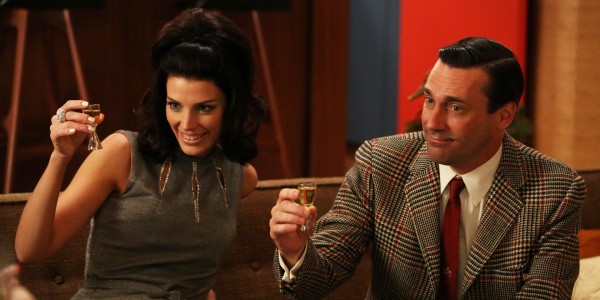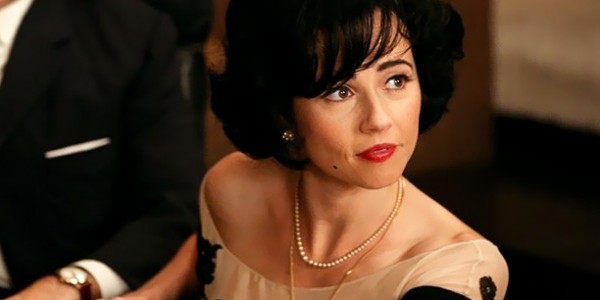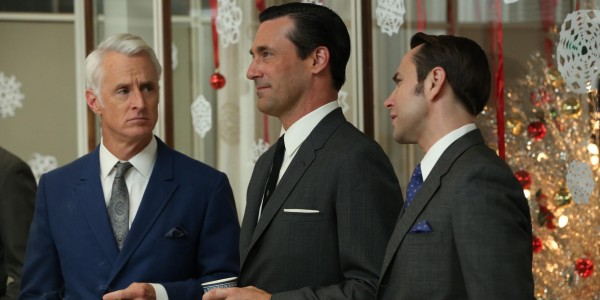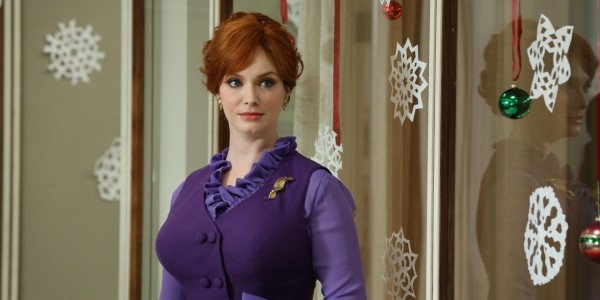Season premieres are difficult episodes to review, so much time is spent playing catch-up and re-familiarizing with the characters that the practice of in-depth analysis along with a restatement of the events that transpired in the episode could easily become a muddled mess. “The Doorway” was a strong return for the AMC drama; the two-hour premiere established many of the characters’ situations as well as introduced various thematic topics that will become more pronounced as the season progresses. With that said, I will approach breaking down the episode as simply as possible, by character. Let’s start with Don, shall we?
After much speculation about the fate of Don and Megan’s marriage and Don’s ability to remain faithful, we learn that he has in fact been unable to remain loyal. As the fifth season of Mad Men came to a close, many were wondering whether Don Draper had actually changed his ways. Had his relationship with Megan transformed him into a devoted, caring husband? Much of the season dealt with the idea of change, or personal growth: Do people really change, or are we doomed to make the same mistakes over and over again? This has been a central theme of the series in its entirety and continues to be an important aspect of the show.

The last scene of the fifth season hinted at Don’s inability to completely change his ways, the ambiguity of that final moment left audiences doubting his transformation. Surely, many viewers hoped that the Don they knew in the earlier seasons would reemerge since his turn in behavior was a point of contention for many. The sixth season opens with a man receiving CPR, we see it through his perspective, Megan screams off camera and we assume that it is Don who has taken ill. Then we hear Don speak in voice over, he narrates from the opening passage of Dante’s Inferno, “Midway in our life’s journey, I went astray from the straight road and woke to find myself alone in a dark wood.”
This is the only time we hear his voice in throughout the first eight minutes of the episode. As the scenes pass we see Don nod and gesture his way through conversations, Megan does most of the talking. His voiceless-ness is an appropriate echo to the closing scene of the season five finale, in which his silence suggested a return to his transgressive behavior. Our last memory of Don is almost defined by his lack of voice or agency and it is paralleled in the first moments of the premiere. Don’s very passive conduct communicates a kind of indifference to his current situation. It immediately suggested that something was off in the marriage, at least from Don’s side. When it is finally shown that he has been having an affair with Sylvia, it doesn’t come as a huge shocker or surprise, the presence of an affair was almost expected.
What is more surprising is Don’s self-awareness, when Sylvia asks what he’s hoping for in the new year he says, “I want to stop doing this.” He recognizes the self-destructive nature of his behavior, as he had previously done way back in season 4, but seems resigned to continue in this detrimental path. The prospect of change seems impossible; the inevitability of his behavior dominates any desire he has to truly better himself. This idea of inevitability is enforced through Roger’s statements in his therapy session: “Look, life is supposed to be a path and you go along and these things happen to you and they’re supposed to change you, change your direction. But turns out that’s not true, turns out he experiences are nothing.” Don has chosen to go through many different paths; he has gone so far as to change his identity in order to, what? Obtain happiness? Contentment? Whatever the reason, Don’s choices have led him to commit the same mistakes repeatedly and ultimately led him into a very familiar state. Is there really a difference between his relationship with Sylvia than to the one he had with Rachel Menken, or Suzanne Farrell, or even Bobbie Barrett? Probably not.

When Megan and Don make it back from Hawaii, we learn that it was the doorman, Jonesy, who had the near fatal turn we saw in the very beginning. Witnessing such an experience has deeply affected Don, and he seems to be completely preoccupied with death. His campaign for Sheraton is morbidly suggestive of suicide; is Don projecting his own desires into his work? I don’t believe that Don is suicidal, necessarily, but he does have a unique relationship to death. As Dick Whitman, he has already died; he has gone through a very specific kind of death and emerged as a new man. Maybe because of this, death does not hold the kind of power it has over most people, over Don. We are conscious of our own mortality and we chose to put that in the back of our minds in order to live our lives, we ignore it for our benefit. Just like Roger explains, they were able to sell death through cigarettes by ignoring the very real consequences. Don seems to not be interested in ignoring it, but instead embracing it as a part of life, his interest is more on the curious side. He questions Dr. Rosen about the topic and
Roger is a character that seems stagnant; his life is composed by a multitude of unwavering constants. He has had the same job forever; he has surrounded himself with the same people for years, etc. but there is a significant blow to his predictable lifestyle. He learns that his mother died, in a great darkly comic scene played beautifully by Beth Hall and John Slattery, and while initially it seems to not affect him much, he is eventually devastated by the loss. We first see him in the middle of a therapy session in which he relates his view of life; discussing the futility of choice and action, “… experiences are nothing…you’re just going in a straight line to you know where.”
We know he has grown up in wealth and hasn’t had to make much of an effort for anything, really (except, maybe for his time in the war, which we are not privy to), but now he seems even more passive than ever. Accepting that whatever he does, life will ultimately end the same way and that there is no point in attempting to change anything. As he gets the news of the passing of his shoeshine guy, Giorgio, and gets delivered the kit it all seems to be crashing onto him (his grief over his mother, his life). He feels the world that surrounds him changing, in transition and for a man who has been so adverse to change, it is a scary prospect. It will be interesting to see if is mother’s death, his realization that things change, will affect him in a significant way. Will Roger Sterling become an active member of SCDP investing some energy into his company?

Betty is also finding difficulty with the changing world she finds herself in. She becomes increasingly protective and invested in Sandy’s well being. It is not necessarily clear why exactly Betty cares so much about the young girl, it could be because Sandy is just a year older than her own daughter, Sally, and Betty is afraid of Sally’s future. Sandy could also remind her of herself when she was younger, eager to get out in the world, without being aware of the harsh realities that await her. Sandy’s description of what lies ahead for her, “you go to college, meet a boy, you drop out, you get married struggle for a year in New York while he learns to tie a tie and then move to the country and just start the whole disaster over” hits close to home for Betty, it’s almost exactly what she went through with Don. Does this make her look into herself, doubting her current situation? How is her life with Henry and different that her time with Don? Maybe this confrontation with Sandy makes Betty question her choices and her own agency, which is what may have inspired her sudden transformation at the end of the episode. Betty comes into the house with a new look, having dyed her hair black. This impulsive act seems to be her attempt at gaining back some control over herself and her world.
Perhaps the only character that is embracing change from the get-go is Peggy, who in her new job seems to be thriving creatively and professionally. She is again shown as a character that can adapt to whatever obstacles/changes come her way, exemplified in this episode by the Koss headphones dilemma. One of the big questions that emerged from the fifth season was the extent of Peggy’s involvement in the series. It certainly seems that we’ll be getting frequent glimpses into Peggy’s life and her work over at CGC. In this episode we see her in her new authoritative position as she handles a mini-crisis. Much like her experiences over at SCDP, Peggy is left with a lot of the workload and in this specific situation has to handle a client’s concerns while her boss is off doing god knows what. What is significantly different though is that when Teddy Chaough finally shows up at the office, he is apologetic and kind; he praises Peggy for her work and even tells her to take it easy on her subordinates. She is still adjusting to her higher position and while employing a tough no-nonsense attitude with her staff, much like her mentor Don, she doesn’t ever seem cruel or overly harsh. I expect that we’ll be getting more work stories from CGC and explore Peggy’s professional trajectory within the agency.

Random Thoughts:
-- Almost no Joan or Pete tonight, missed them.
-- Sally is one sassy teenager, I kind of love it, but she seems to be more and more like Betty as time goes by.
-- I still don’t get that rape joke Betty says to Henry. So grim and dark, are we just to assume that this is her sick sense of humor or is there more to this story? Total WTF moment.
-- Peggy is still with Abe and living in the same apartment, I love how messy the production team made it look, you just know these two spend most of their time away from the apartment and could care less to tidy up.
-- How great was that Peggy/Stan conversation, so great to see that these two talk regularly. Also the Joan/Sterling gossip stuff was great.
-- Every scene with Peggy talking on the phone this episode was golden, her conversation with the pastor was hilarious, got a very concise history of Peggy’s religious upbringing, “and also with you, goodnight.”
-- It was interesting to see how an agency would handle possible PR trouble in a pre-internet, pre-youtube world. The fact that they had to find some random employee that saw the episode of the tonight show in question was great to see, especially since it is so easy nowadays to find almost anything on the internet.
-- When Linda Cardellini showed up as Sylvia I just knew she was Don’s new love interest. You don’t hire Lindsey Weir just to be Dr. Rosen’s wife.
-- I felt serious love-like vibes from Chaough when he was talking to Peggy, I second Stan’s observation.